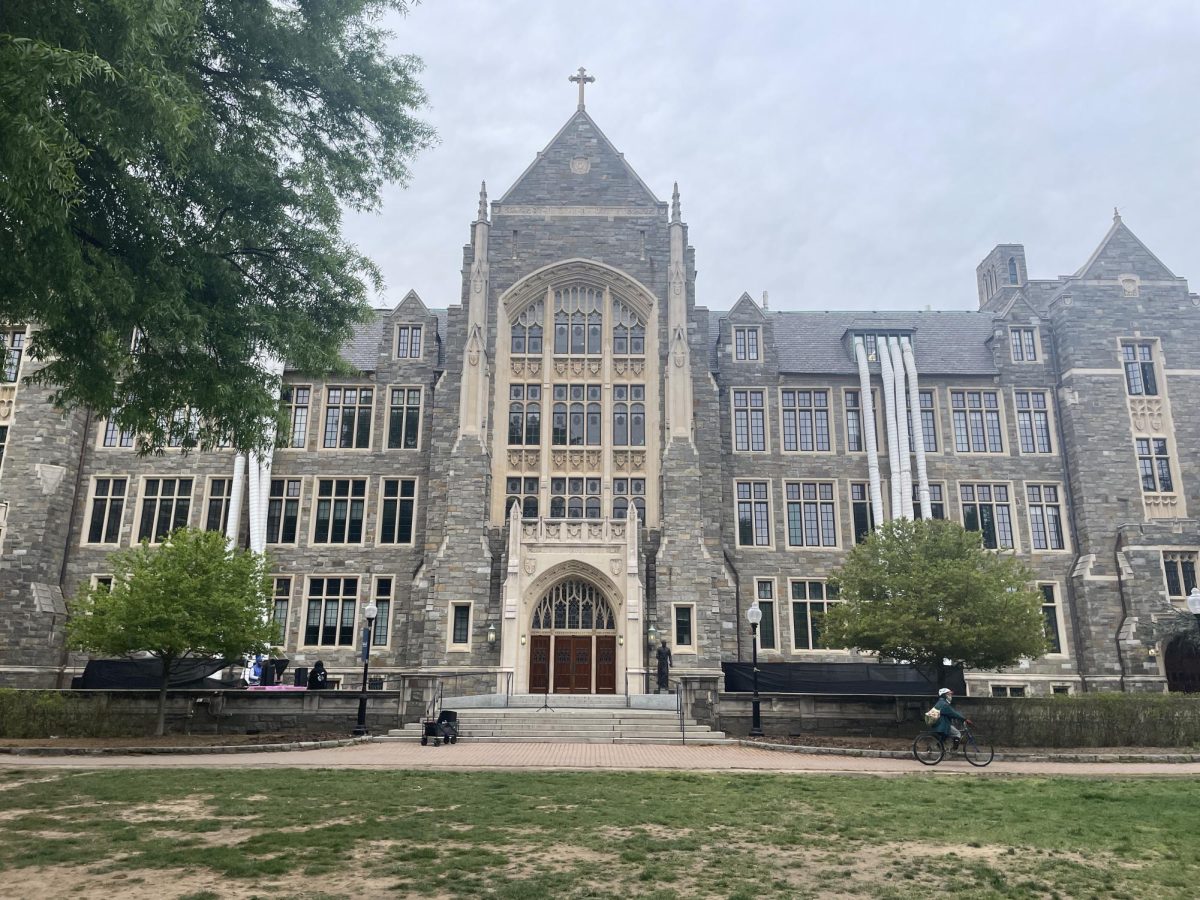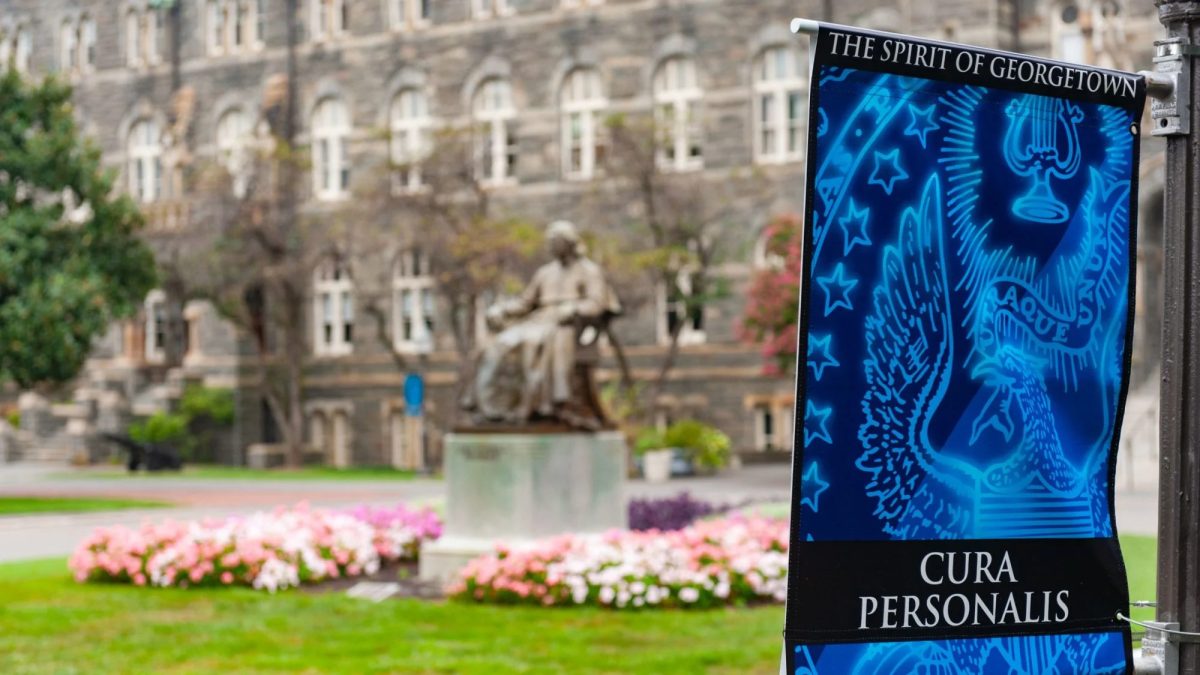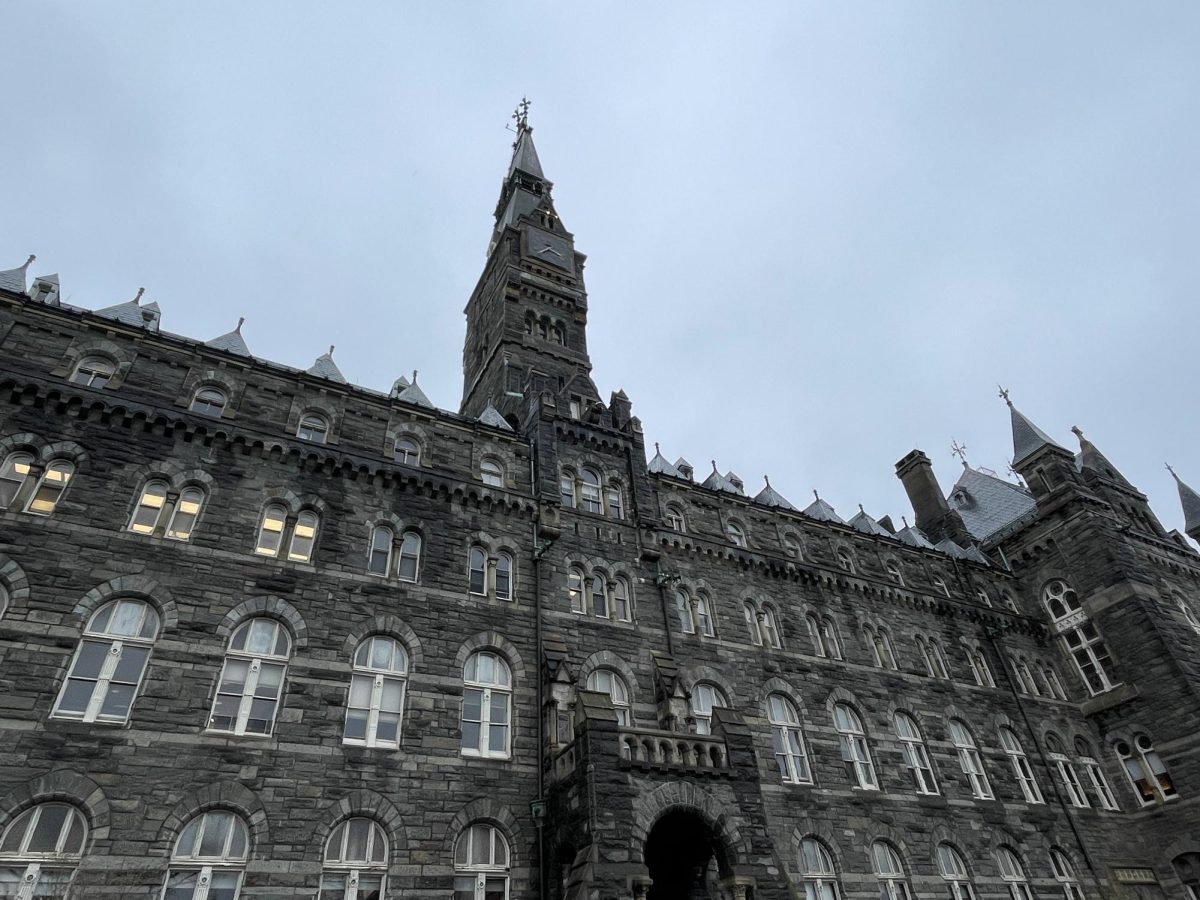The results of last Thursday’s Georgetown University Student Association senate restructuring referendum will not be released or certified before winter break, after the GUSA Constitutional Council extended its enjoinment of the Election Commission at a public hearing yesterday.
The ruling comes on the heels of a complaint of unlawful electioneering filed late Thursday evening. The complaint alleged that GUSA members violated the association’s constitution and bylaws by electioneering at polling stations, offering food at polling stations as bribes, placing an excessive amount of “yes” posters at polling stations and locating tabling stations outside permitted tabling zones.
The Election Commission normally has 72 hours after the end of voting for the referendum to release the results, which slotted the release for Sunday at 11:59 p.m. However, this evening’s decision ensures the enjoinment will remain in place until the council announces its formal opinion on the complaint by Jan. 20.
GUSA bylaws require the council to release its formal opinion 10 working days after the case is heard, excluding final examination periods and holiday breaks. The council said it plans to write its decision during winter break.
The commission first announced it would hold the results early Friday morning after the Constitutional Council initially received the complaint alleging campaign violations.
The decision to continue holding the election results past the typical deadline was announced at 6:08 p.m., several hours after the council held the public hearing on the complaint.
GUSA Senators Jasmin Ouseph (SFS ’19), Isaac Liu (COL ’20) and Charles Hajjar (MSB ’20), GUSA Free Speech Policy Team Chair D.J. Angelini (MSB ’17), GUSA Dining and Auxiliary Services Policy Team Chair Mark Camilli (COL ’19) and Dylan Hughes (COL ’19), who is unaffiliated with GUSA, filed the complaint Thursday evening.
GUSA Senate Speaker Richie Mullaney (COL ’18), GUSA Chief of Staff Ari Goldstein (COL ’18) and GUSA Senator William Morris (COL ’19), who represented GUSA as respondents at the hearing, said the results should be released by the Election Commission.
According to Ouseph, there is evidence that the electioneering was intentional and planned by GUSA.
“There is substantial evidence of people being encouraged to vote ‘yes’ at the GUSA polling stations that were set up last Thursday. There’s also evidence of GUSA leadership explicitly stating that the primary intent of polling stations was to mobilize voters and get club funding reform passed,” Ouseph said at the hearing. “The overall majority of people who were staffing these tables were supporters of the amendment.”
In an email sent Wednesday obtained by The Hoya, GUSA members manning the polling booths were told they were allowed to explain the referendums, but that they could not force voters to vote for or against the referendum.
The petitioners also testified that several of the polling stations prominently featured “yes” flyers, without a comparable number of posters espousing the opposite view.
“All of this indicates that there was a premeditated effort by GUSA leadership to sway the vote at polling stations,” Ouseph said.
Mullaney said the volunteers’ conduct at polling stations was legal because the bylaws prohibiting electioneering at polling stations only apply to candidates and contain no restrictions on campaigns for referendums.
“First, that the use of polling stations was unconstitutional — we believe this claim is incorrect due to the bylaws and well-established precedent. In the bylaws, it does state that candidates or anyone acting on behalf of a candidate cannot set up polling stations with electronic equipment. In a referendum, there are no candidates,” Mullaney said at the hearing. “There are no rules in the bylaws governing the campaigns of referenda.”
GUSA Election Commissioner Aiden Fletcher (SFS ’17), who argued on behalf of the respondents, said the electioneering was not in keeping with the spirit of campaign rules, but did not violate the bylaws or constitution in their current forms.
“The bylaws were very narrowly interpreted. It was a very strict reading, and it didn’t align perhaps with the values of what I think makes an ethical campaign. And the restrictions we’ve put on candidates should definitely apply to referendums,” Fletcher said. “I’m saying should, because I do not think they currently do. You can see that GUSA was out of sync with the spirit of those rules, but they were totally within the bounds with what they did. I don’t think there’s any constitutional standing or bylaw standing to prosecute.”
The petitioners also argued that one of the polling stations was set up in front of O’Donovan Hall, outside the free-speech zones designated in the university’s Speech and Expression Policy, making them improper.
Because the interior of Leo’s is a free speech zone, the location of the polling station outside Leo’s is not relevant, according to Morris.
“It was set up on the left-hand side of the door. The other side of the door is a free-speech zone, and inside is also a free-speech zone,” Morris said. “So if we’re really debating over moving it over 20 feet as the issue of this referendum, I don’t know if that is as pertinent.”
Neither the outside nor the inside of Leo’s is listed as free-speech zones in the university’s Speech and Expression Policy. The only free-speech zones listed that do not require special permitting are public squares and certain locations outside of Lauinger Library, Henle Village, Darnall Hall and the Healey Family Student Center.
All the other polling stations set up by GUSA were within free-speech zones. The table outside Leo’s was removed for logistical reasons before the illegality of the polling location was brought to the attention of the volunteers.
Mullaney said he would support a discussion of changing or clarifying campaign rules in the future, but that under the current rules, GUSA acted legally and with good intentions.
“I agree that while we can think that certain actions are probably inappropriate from GUSA, that is separate from the legality of the actions themselves, which I believe were absolutely allowed by the constitution and the bylaws and GUSA acted in completely good faith,” Mullaney said.
In an interview with The Hoya, Camilli said the bylaws, though narrowly worded in reference to candidates, were clearly intended to regulate campaigns generally.
“Although the constitution bylaws don’t explicitly state much on referenda, it’s pretty clear that the restrictions they’re trying to place, even though it might explicitly be defined for candidates in presidential elections, is trying to apply to campaigning in general,” Camilli said. “Really what we’re getting at is violating the spirit of the law is also violating the law.”


















